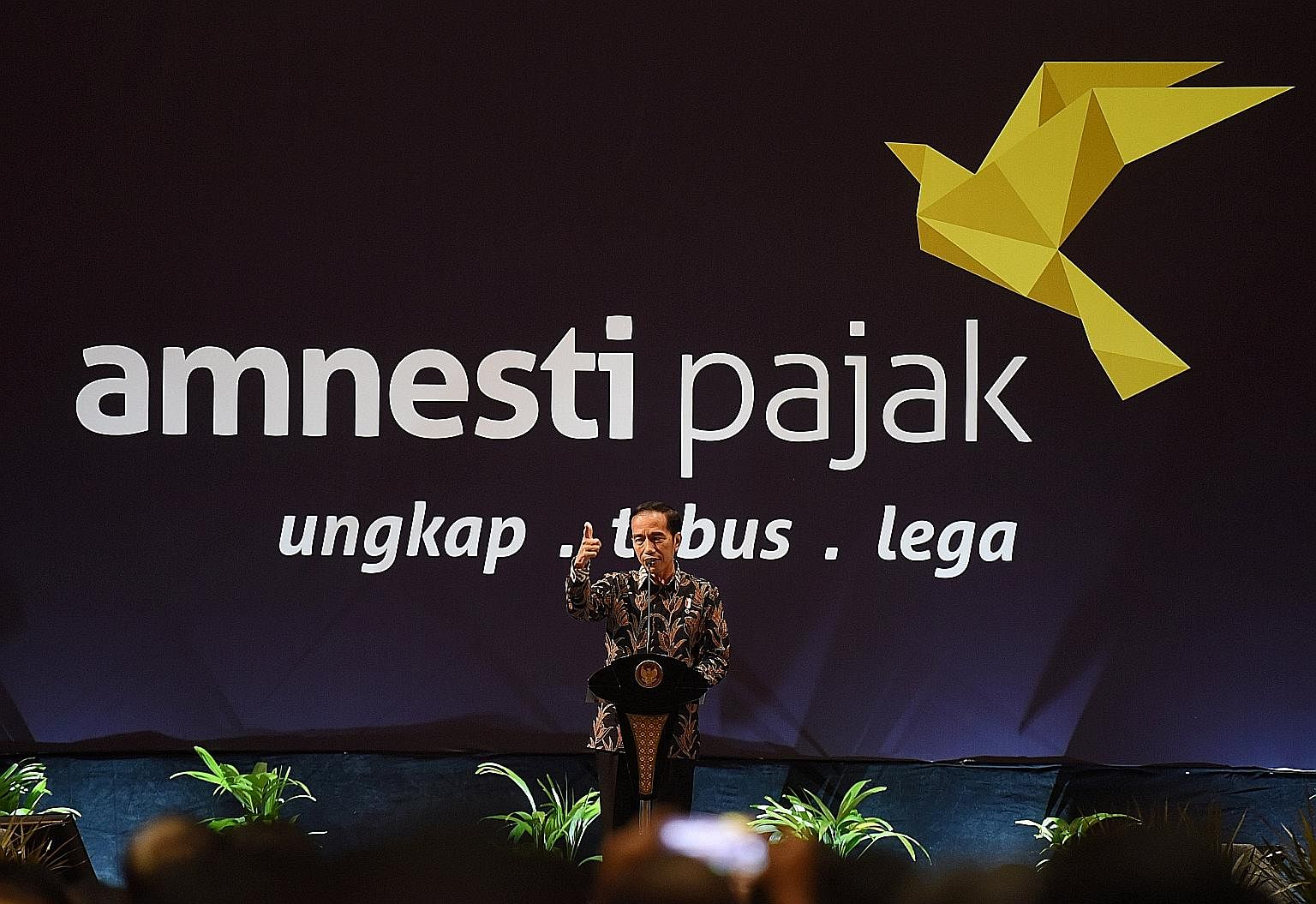With a stroke of a pen, President Joko Widodo effectively ended banking secrecy in Indonesia by issuing a decree last Tuesday to grant more powers to the taxman.
The move means all banks, insurance firms and financial institutions must open their books to both the local and foreign tax authorities when ordered to do so for tax collection purposes.
Starting from April next year, they must also automatically report the identity of any client who deposits more than 500 million rupiah (S$52,000).
This is not only a big step for tax reforms in South-east Asia's largest economy, but it will also pave the way for the country to take part in the global Automatic Exchange of Information (AEOI) on tax matters.
About 100 tax jurisdictions, including G-20 member countries, have committed to the AEOI, which was initiated by the Organisation for Economic Cooperation and Development (OECD).
Indonesia, Singapore, Switzerland and Hong Kong are among those which have announced that they will start exchanging information under the AEOI to combat tax evasion next year.

Banking secrecy laws had previously shielded financial institutions from the taxman, who is required to file requests to Indonesia's Financial Services Authority before being granted access to a taxpayer's accounts for investigations.
This can take more than six months and in some cases, allow an errant taxpayer to destroy evidence or move his funds out of the country, in a bid to avoid taxation.
Lawmaker Johnny G. Plate, who sits on the parliamentary finance committee, said that as a G-20 member, it was imperative for Indonesia to commit to the AEOI, especially if it is serious about its tax reforms.
"If we do not satisfy this condition, Indonesia would have failed to fulfil that commitment and be regarded as a destination country for illegal funds," he added. "This will undermine investor confidence and potentially disrupt the stability of our national economy."
Last year, Mr Joko embarked on an ambitious plan to tighten what has been a loose tax regime.
A key plank for the move was a tax amnesty aimed at recovering billions of dollars lost over decades to widespread tax evasion and in assets hidden overseas by wealthy citizens and businesses.
Mr Joko was also hoping the move would help raise capital that can be used to fund infrastructure and developmental projects that Indonesia needs to grow its economy.
But while more than 4,500 trillion rupiah in assets were declared under the amnesty - which exceeded the 4,000 trillion rupiah target - only 145 trillion rupiah out of the 3,396 trillion rupiah worth of assets overseas were repatriated.
Observers said this may explain why Mr Joko decided to sign and push through the regulation in lieu of law, known as a Perppu. The government could have proposed a Bill instead, but a new Bill would require Parliament to ratify and that could take more than a year, putting Indonesia at risk of missing the 2018 deadline to comply with the AEOI.
However, even though a Perppu is effective once the President signs it, Parliament can still repeal it within the year it is issued. "So there is still a 50-50 chance that the Perppu may be repealed," said state administrative law expert Irman Putra Sidin.
Some critics say the latest move by Mr Joko may spark opposition from his political rivals, especially lawmakers whose wealth may be under threat from such exposure.
But there are also concerns that the tax data may be abused by errant tax officials in Indonesia, which has occurred in the past.
So while the purpose of the new rule is to improve efficiency and effectiveness of the local tax regime, the government must ensure that the new rule is not abused, including by those who would use it to intimidate or pressure taxpayers, said lawmaker Hendrawan Supratikno. "There must be a guarantee that the data can be used only for taxation purposes," he added.
Finance Minister Sri Mulyani Indrawati, however, has underlined that banking secrecy is a thing of the past worldwide.
"Every bank customer must now understand that financial data in financial institutions may be accessed by tax authorities," she said last week.
"So this Perppu is aimed at allowing Indonesia to safeguard its national interests at an international level, because it is not just information, but also funds and assets that may move across countries and erode Indonesia's tax base."

